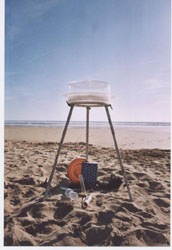Early warning system for beach damage
Beach profiling is the common way of monitoring beach erosion, but the problem with this is that it can only provide a snapshot as it strongly depends on seasonal, climatic and tidal changes. Organisms are extremely sensitive to environmental changes and so modifications in behaviour may sound an alarm. Deviations in an established pattern may be telling us that we need to protect our vulnerable coastlines. This research began with the hypothesis that 'animals living on the beach know its trend of change and will orient accordingly'. Researchers carried out the experiments on various beaches in the Mediterranean, including southern Tuscany and the Mediterranean coast of Morocco. On the Italian beach, the researchers examined the orientation of sand hoppers. Four points one kilometre apart were studied, compared concurrently, and the distribution of sand hoppers recorded. The teams found that at the eroded point of the coastline there was a more disperse scattering of sand hoppers. On the Moroccan beach, the teams conducted the same test. This time, the researchers found that the differences in orientation corresponded to the different uses of the beach. The scientists have designed the study so that coastal managers can implement it at a low cost, and obtain results easily and rapidly. This means that the authority can intervene before the damage done to beaches becomes irreversible. By applying restrictions and measures to respect the natural equilibrium on the beach, this study helps contribute to sustainable tourism. The research team is furthering its testing to assess the environmental impacts on different coasts of the Atlantic, Pacific and Baltic, where it will be collaborating with local teams of ecologists.







